'We say we are proud to be Indian. Can we be proud of such an India where its people are hungry and on the streets?'
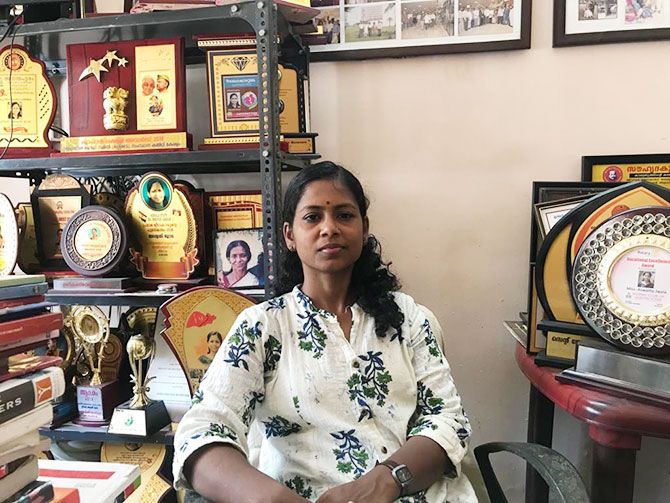
India found out about Aswathy Jwala, an activist from Kerala during American President Donald J Trump's visit.
When news of the Gujarat government's decision to build a wall along Trump's route so that the slums became invisible to him, Aswathy rushed to Ahmedabad and decided to sit on a hunger strike.
The Gujarat government and the security forces did not let her do it, and she was sent back. to Kerala.
That was when Shobha Warrier/Rediff.com met Aswathy at the Jwala Foundation office in Thiruvanathapuram.
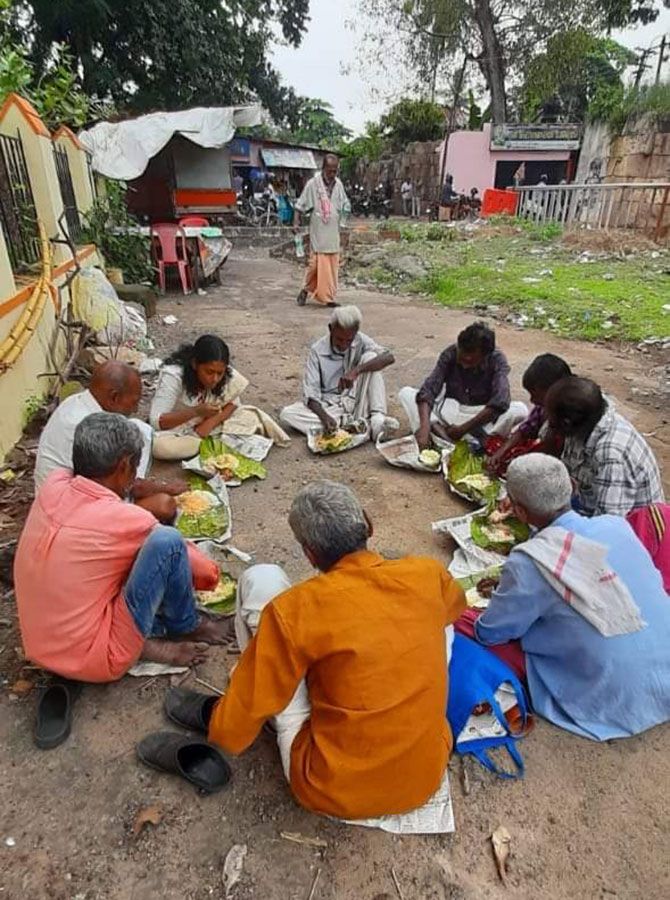
Why did you decide to go to Ahmedabad from the southern-most part of India to protest against building the wall on the American president's route?
To tell you the reason, I have to first tell you my story, that too from the beginning.
I was born and grew up in a slum in Thiruvananthapuram.
So, I understand the pain associated with rejection and discrimination.
My mother worked as a maid in many houses to bring us up.
After school, we would go to each house calling out her name.
We would go in through the back gate where she was working at that point of time; we were not supposed to use the front gate as our mother was a maid.
Then, Amma would give the three of us food.
If you think we ate from a plate and in the kitchen, you are wrong.
The food was given to us in an empty milk packet, and we would sit in the backyard under the coconut tree and ate.
Even as a child, I felt humiliated by this treatment.
I understood at that age itself that we were discriminated against because we were poor.
I do not know when and why I had this strong desire to rise above all this, and work for those who face such discrimination.
What do you remember about the struggles your mother had to go through?
My mother was like a well-oiled machine which never stopped.
Even after working in 3-4 houses the entire day, she would not rest once she was back home.
She operated a thattu kada and sold dosa in the evening, which continued till midnight.
Next day, early morning, she was back working in other people's houses.
I had not seen her taking rest even for a second.
So, I always wanted to be someone who could share her burden.
There was no father in our lives; he abandoned us when we were very small.
I would say we lead a very insecure life as mother could come home only 7 in the evening.
Till then we lived like street kids.
Did you realise at a young age itself that you had to study hard to come out of the kind of life you were leading?
From the 5th standard onwards, I was first in school, and hence awarded Rs 1,000 every year as scholarship which was a very big amount for us.
I gave the money to my mother and she used to take care of the house.
As there was no one to help me in my studies, I joined the free coaching centre in our slum where many teachers came to help us.
From the 4th standard till I reached the 10th, I managed to perform well thanks to the support I got there.
If not for the free coaching class, I would not have come out first in school.
I wanted to be a nurse so that I could help those in pain.
Unfortunately, I had no means to prepare for the entrance exam; I just went and wrote the exam.
Anyway, I didn't get admission in any nursing college, and my dream ended there.
Then I decided to study B Com and after my graduation, started working as a medical representative.
As I was working, I also took a law degree later.
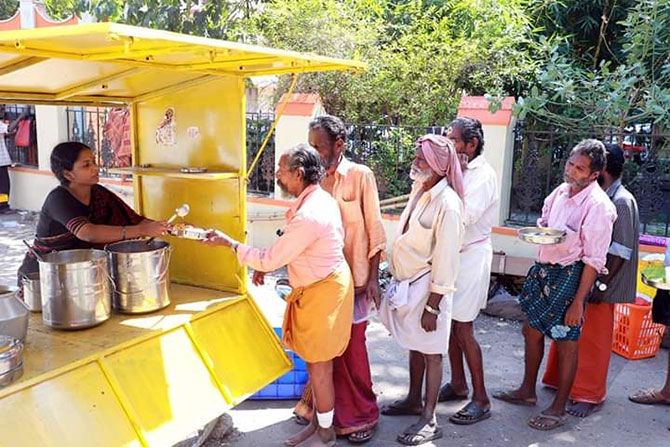
I remember reading about you spending your first salary to buy food for the hungry...
Was it because you experienced hunger as a child?
Yes, we had experienced hunger many, many times.
Never in life can I forget the humiliation we had to undergo, sitting in the yard and eating food.
In the evening, Amma used to bring three balls of rice wrapped in a milk cover.
These were made of leftover rice, sambar, vegetables and fish from the houses she worked.
We would stand in a line, and Amma would give each rice ball in our hands.
That used to be our supper.
It also exemplified the humiliating way we were treated by others.
That was the reason I wanted to feed the hungry.
And I used my first salary of Rs 7,000 to do so.
This was also the time I became spiritually aware.
Till then, I didn't even know what spirituality was.
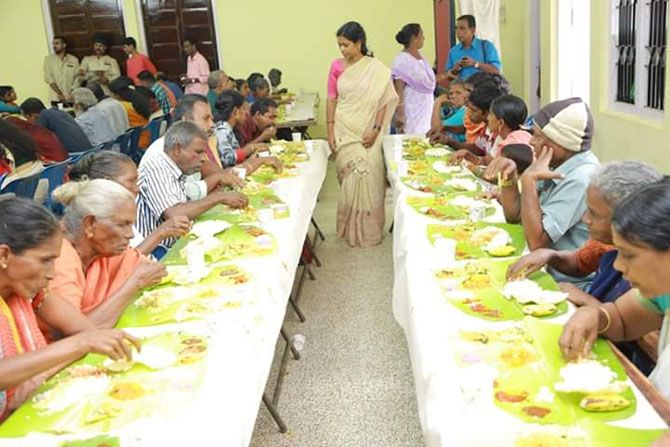
What was the trigger?
It could be what I went through in life.
Maybe I had reached a point from where I had to take a deviation.
One fine day, I got the feeling that there was no difference between human beings; that all were the same.
I also realised that I had within me enough love to give every single human being in this world.
When I got this awareness, I took out my two-wheeler and went on a long ride.
I felt love was overflowing from my body and mind towards everything that I saw on the way, and that included the trees and the animals.
What happened to me was beyond my comprehension.
I felt it was my re-birth.
It indeed was my rebirth.
I started feeding the hungry from the next day.
We made lunch at home and distributed the food packets to five old people near my house.
Our food packet had rice, sambar, avial and pickles in it.
Even today, our menu is the same; rice with one curry and one vegetable.
That was the beginning.
Then, we started distributing food packets at the railway station and bus stand where many hungry people would be sitting on the roadside.
Five packets became twenty and we carried the food on my two-wheeler.
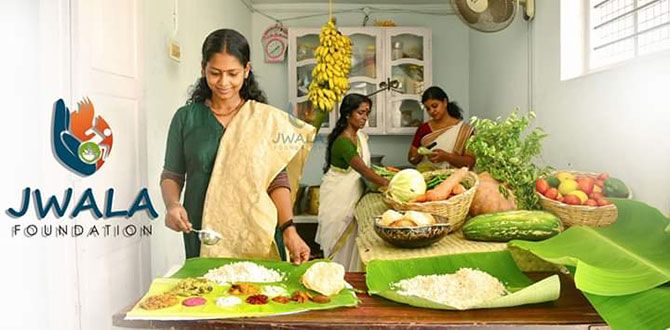
You used the money you earned as your salary to prepare lunch for so many people.
Did you feel like spending anything for yourself?
Till then, my desire was to have all the things that were denied to me as a child, whether it was food or clothes or all the other material possessions.
I realised soon that what gives you happiness was not buying such things for yourself, but sharing whatever you had and watching other people feel happy.
That's why I said, I had a rebirth.
I became a person that was exactly the opposite of what I wanted to be.
Till then, I prayed only for my own and my family's happiness and well-being.
After my rebirth, I started praying for every human being; loka samastha sukhino bhavanthu.
I would say the most precious gift I have had in my life is this consciousness, this awareness.
When did other people start donating for your effort?
I was lucky that the media in Kerala gave me a lot of support.
Because they wrote about what I was doing, within six months, I had many people joining my effort by donating money.
As I became more conscious, I started hating the political system.
I felt it was because of them that we have so many people living in such pathetic conditions and suffering from hunger.
If they had done their work properly, these people would not have been on the streets without clothes, shelter and food.
You named your organisation, Jwala Foundation. Is it about the fire within you?
Yes.
It was in 2016 that I registered Jwala Foundation.
I didn't have any mentor, I didn't have any support system.
I was all alone.
I just went ahead believing in the rights and wrongs that I had followed all my life.
Yes, I have made many mistakes.
I have fallen down many times, but I was able to get up and walk stronger.
I can confidently say that I didn't do anything that will prick my conscience.
The path I have chosen is pure and without any compromise.
Other than providing food, I was also arranging the funeral of the homeless people living on the streets.
I was doing all this alone in those days.
The people I met and the sights I saw made me think more about my country, and the kind of inequality we see everywhere.
We say we are proud to be Indian. Can we be proud of such an India where its people are hungry and on the streets?
On one side, the political establishment spends crores of rupees constructing statues, on the other side, you have people on the streets.
I see such people every day.
Even when I give them food, their condition is such that they have to sit on the footpath and eat it.
Like you had to eat your food sitting under the coconut tree...
Yes.
I know the distance between the dining table and the coconut tree in the backyard, or the footpath.
You don't need to read anything to understand this harsh reality.
I had experienced it, and I see it every day.
I felt my own experiences and the pains of other people are like fuel which can transform into a fire...
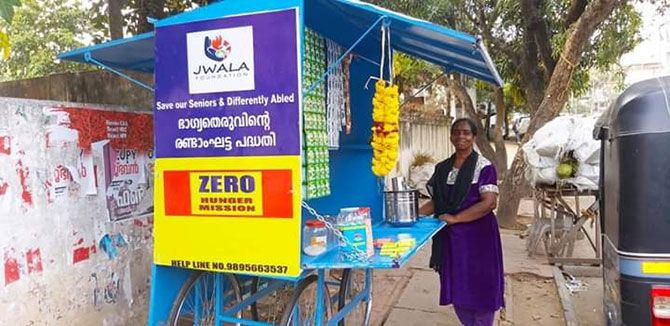
So, your organisation became Jwala...
Yes.
The fire came from within, and Jwala was born.
Our motto was to provide food, shelter, dignity and take care of the rights of the people who are denied all these.
I cannot forget the kind of support I got from the Malayalis who live abroad.
If not for them, I would not have been able to provide food for 180 people, 365 days a year.
We rescue people and rehabilitate them with their families.
We also donate mobile shops so that a person can have a livelihood.
We have so far given 120 such shops in the city.
What was the controversy surrounding a Lithuanian woman who disappeared in Kerala?
I read that you got involved in the rescue and made a lot of enemies in the process...
It was in 2018 that she came to Kerala and disappeared.
While her partner and sister came here looking for her, somebody told them that Jwala rescued people from the streets.
That was how they approached us to find out whether we accidentally saw her.
I was with them for two months searching for her till we found her body in an isolated forest area, raped and mutilated.
I couldn't keep myself from talking about the failures of the authorities from the time she disappeared.
The result was, the Communist party turned against me.
In fact, even before this incident, I have had a few skirmishes with the government on human rights issues and without knowing, I was labelled as a rebel and an enemy of the government.
But why did the Communists call you a Hindutva-vaadi?
Because I spoke against the establishment that was ruled by the Left.
The attack against me by the Communist party became so harsh that I found it even difficult to survive here.
The media, which was with me, suddenly turned against me.
Somebody filed a case against me saying I was getting unaccounted foreign money.
Were you rejected?
Yes.
I have been working sincerely all my life.
I wondered why I got involved in the case.
It was not just a case that was within the area of my operation, I wanted them to carry a good image of our country.
I was totally shaken, sad and disappointed when I was attacked brutally by the ruling party, labelling me as a person who collected money from foreigners.
Did you feel like running away?
No, I didn't feel like doing that.
Jwala has been my life.
I was sitting at home, totally dejected when I got calls from Malayalis all over India; from the jawans to young people.
They all encouraged me, supported me and wanted me to continue what I was doing.
I didn't know there were so many people who were willing to support me.
It was so rejuvenating.
When I as a human rights activist was hunted by the ruling party, party leaders from the Congress and the BJP came to my home and offered full support.
That was when the Communist party made me as a Sanghi even though leaders from both the Congress and the BJP supported me.
As you know, you just cannot live in Kerala if you are labelled a Sanghi.
That's how Kerala society is.
Here I was, a person who was feeding the hungry without looking at their caste or religion, was made a Hindutva-vaadi.
I was clueless and didn't know how to move ahead.
I didn't know why I was misunderstood.
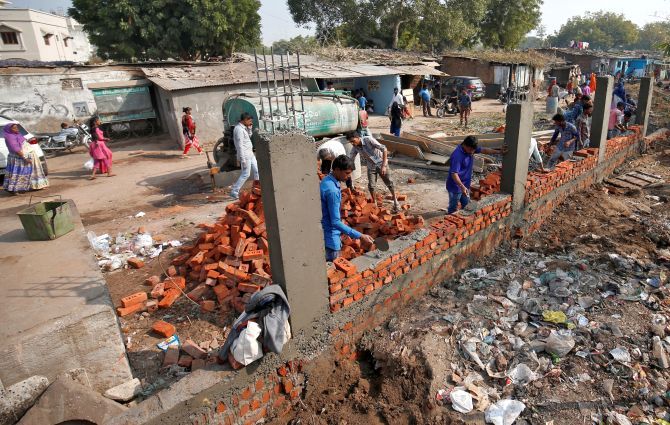
In what way did the construction of a wall to hide poverty from Trump, affect you?
I am still the same person who grew up in a slum.
So, I just couldn't accept the fact that a government had the audacity to hide a group of poor people from a guest as if they were not human beings.
It was an impulsive decision on my part to make a trip to Gujarat to protest against this discrimination.
I knew I was going to a place I have only heard of.
I didn't know the language too.
But I couldn't remain silent.
Vishnu who works for Jwala, also came with me as I was going to an unknown place.
We travelled by train, in the unreserved compartment, sitting on the floor near the toilet.
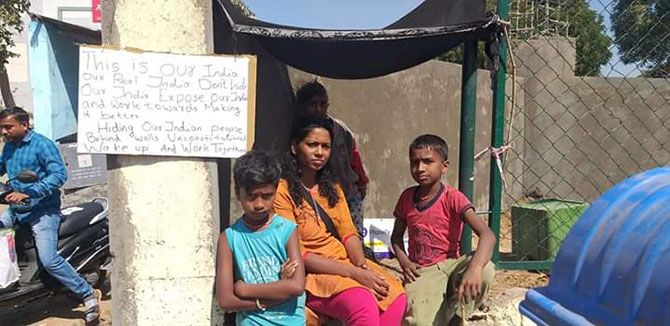
Once we reached Ahmedabad, we took an auto looking for the wall and the slum near Sabarmati Ashram.
We didn't have much difficulty locating the place.
I met the slumdwellers and spoke to them through a media person.
I told them that I was going on a hunger strike against the construction of the wall.
Till that moment, I had no plans to sit on hunger strike.
Both Vishnu and I sat there on the road at night, and I started my hunger strike in the morning.
By afternoon, so many people from the slum were there on the road, so also a lot of people from the media.
Women from the slum spoke to the media criticising the government and Narendra Modi.
I had never done a strike before, and it was a new experience for me.
It was overwhelming when an old lady tried to touch my feet...
By 8.30 at night, four women policemen in mufti came to arrest me.
I gave my phone and purse to Vishnu before going with them.
But what they did next shocked me.
They wanted to arrest Vishnu also who had nothing to do with any strike; he had come just to be with me.
Vishnu worked for Jwala, and he had nothing to do with what I was doing.
Arresting him was very unexpected.
And I didn't know what to do.
They questioned me for an hour at the station, and then told me that I had no permission to go on strike there.
Without their permission, I could not strike, and they would not give me permission.
Because they arrested Vishnu also, I decided to withdraw the strike and come back home.
I just hope hereafter the authorities will not do such a shameful thing to its own people when a guest comes to India.
When I came back to Kerala, I saw an interesting turn of events.
I was a Sanghi when I went to Ahmedabad, but when I came back, the Sangh Parivar had turned against me accusing me of collecting fund from SDPI (which is linked to the Islamist Popular Front of India) and joining hands with them to malign the country.
In a way, I am happy because nobody will call me a Sanghi anymore.
Now that all the three political parties are against me, I am free to continue with my work!
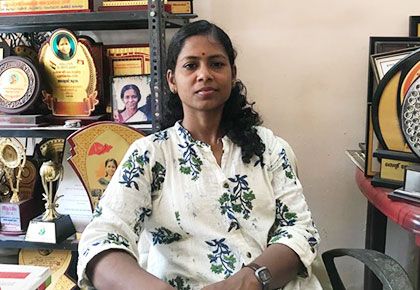

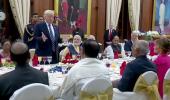
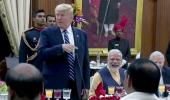
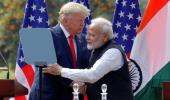
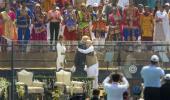






 © 2025
© 2025